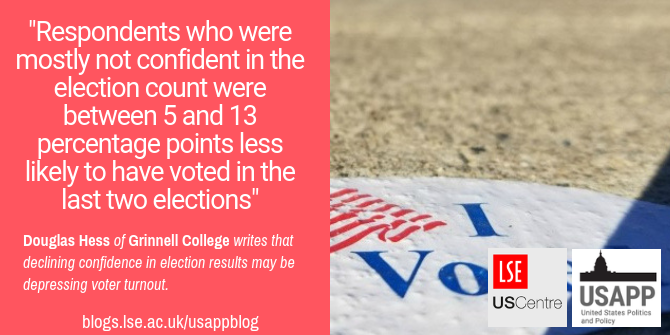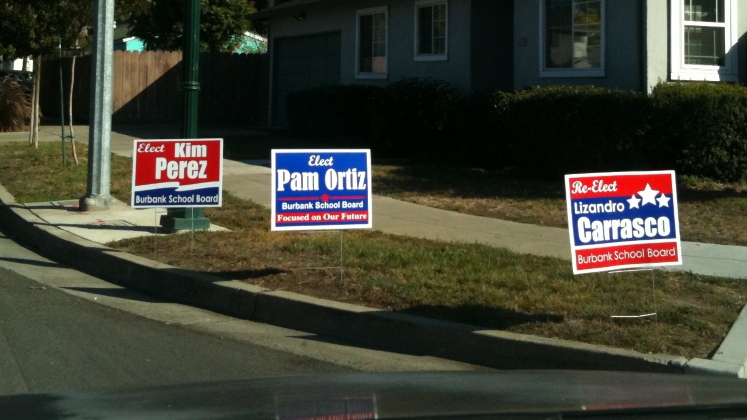 Both the 2016 presidential election and the 2018 midterm elections saw accusations of vote rigging by politicians. Drawing on new survey results, Douglas Hess explores voters’ confidence in the electoral process. He finds that about half of those surveyed have concerns about or were not confident in vote counts, with white conservatives outside the south, non-whites across the country, and, Black citizens in the south most likely to lack confidence. He writes that this lack of confidence in elections may be linked to voters’ beliefs about their ability to participate meaningfully and effectively in politics.
Both the 2016 presidential election and the 2018 midterm elections saw accusations of vote rigging by politicians. Drawing on new survey results, Douglas Hess explores voters’ confidence in the electoral process. He finds that about half of those surveyed have concerns about or were not confident in vote counts, with white conservatives outside the south, non-whites across the country, and, Black citizens in the south most likely to lack confidence. He writes that this lack of confidence in elections may be linked to voters’ beliefs about their ability to participate meaningfully and effectively in politics.
Perhaps the most disturbing new trend in US electoral politics has been the increase in high-profile candidates and officials claiming that our elections are rife with fraud. This concern may seem misplaced given the disturbing allegations of absentee ballot fraud this fall in North Carolina and what the Justice Department’s special counsel investigation is uncovering about the 2016 election. However, the former is rare and the latter unprecedented. Moreover, these investigations demonstrate that suspicious and possibly criminal activities do not go undetected and uninvestigated.
On the other hand, as numerous inquiries have found, attempts to illegally influence elections through the ballot box are less frequent than even the phrase “extremely rare” suggests. But persistent unfounded claims of such fraud have the potential to weaken confidence in democracy, a far more insidious problem than fraud by voters and officials.
Results from a new Grinnell College National Poll give insights into which citizens lack confidence in the November 2018 election. As it turns out, white conservatives, despite accusations of election fraud from President Trump and several outspoken conservative leaders, are neither the only groups concerned about the accuracy of the 2018 vote count nor the groups most concerned. The poll’s results also uncover how a lack of confidence in the vote count is linked with voter turnout and trust in other institutions that are important for a stable democracy.
Increasingly wild claims of fraud
Claims of electoral fraud have always been with us and often appear to be nothing more than sour grapes leveled by a candidate who did not win an election. However following the Florida 2000 election debacle, unsubstantiated charges began to be leveled from new quarters. The myth of massive voter fraud gained new momentum after 2008, a year when Senator John McCain raised unfounded accusations of fraud on a scale capable of “destroying the fabric of democracy” in a presidential debate with then-Senator Barack Obama.
In the decade since, even a few state election officials—most infamously Kansas Secretary of State Kris Kobach—have made wild claims about illegal voting. Fortunately, many more election officials, from both parties, have correctly stated that these accusations are baseless. Moreover, President Trump claimed without evidence that millions had voted illegally in 2016 and that the 2018 elections were being stolen in some states, even as legitimate ballots were still being counted.

““I Voted” sticker; N. Pleasant Street Amherst MA” by Léa Aliberti is licensed under CC BY NC 2.0
Extreme rhetoric in elections, conspiracy theories on social media, and fears over a diversifying electorate, perhaps mean that these false claims will continue. But who is concerned about fraud and what other beliefs or behaviors is this fraud associated with?
What our poll found
We asked 1,000 adult citizens in late November if they were confident that the votes in the midterm election were “accurately counted the way voters intended.” Even though the question asks about the vote count, prior research and the results below suggest that the question serves as a proxy for general confidence in the election.
Of the adult citizens who had an opinion, 50 percent responded that they were mostly confident that the count was accurate. Another 30 percent had some concerns about the vote count, and 20 percent were “mostly not confident.” For simplicity, I will focus on the first and last of the three possible responses and refer to the first as confident and to the last as not confident or lacking confidence.
Confidence did not vary substantially by gender or by age, although voters more than 54 years old are somewhat less likely to state that they were not confident. Also, neither voting for President Trump in 2016 nor identification with a major party—or as an independent—were associated with substantial differences in confidence. This contrasts with research from recent prior elections which have found that party identity can matter. However, the relationship of partisanship to confidence is believed by scholars to be tied to contextual factors specific to the election. For instance, partisans may be less concerned when they feel the election is going their way and Black voters were less concerned when President Barack Obama was re-elected.
Our poll did find strong differences when looking at race and ethnicity. Whereas 16 percent of non-Latino Whites were not confident in the 2018 vote count, the rate was 27 percent for non-whites. The rate was highest for Black respondents at 36 percent. Regarding ideology, those identifying as conservative were significantly less confident (44 percent confident), and moderates significantly more confident (58 percent confident), than all others.
Additional analysis reveals some distinct camps that lack confidence. For example, whites outside the south were 18 percent not confident, which is 5 points higher than whites in the south. In addition, conservatives outside the south were 27 percent not confident, which is 11 points higher than conservatives in the south. There was no such regional variation for liberals in general or white liberals.
The relationship with geography and confidence that we saw in whites and conservatives was reversed for Black respondents. For Black respondents, 45 percent in the South were not confident compared to 28 percent elsewhere, which is similar to the rate for non-whites in general. The high rate of distrust by Blacks in the south may be due both to awareness of past attempts to suppress Black voters in the south and reactions to more recent policies suggested or implemented that many believe target Black and other non-white voters.
While confidence may vary by election, there appears to be three broad groups that are most at risk, so to speak, for reduced confidence: white conservatives outside the south, non-whites across the country, and, in particular, Black citizens in the south.
Confidence and political effectiveness
Although we cannot trace causation with this data, we can look for associations confidence in the election has with other beliefs and behaviors. For instance, prior research suggests that factors particular to a specific election cycle as well as an individual’s experience voting influence their confidence in the results of an election. This, and other research, means that a lack of confidence may be connected to people’s beliefs that they are able to participate meaningfully and effectively in politics.
In our poll, confidence was associated with voting in 2016 and 2018 as well as with plans to vote in 2020. Respondents who were mostly not confident in the election count were between 5 and 13 percentage points less likely to have voted in the last two elections or state they would definitely vote in 2020. Those more fearful for the future—either after the 2018 election or when thinking ahead to the next presidential election—were also 15 to 16 points more likely to lack confidence.
In addition to the risk of directly sowing unwarranted suspicion about elections and the winners, claims of fraud are often deployed to support polices that needlessly restrict access to voter registration and the ballot box. This maneuvering could be destructive in their own right. Establishing, and even advocating for, unnecessary policies based on partisan advantage not only might weaken the representativeness of elections but also further risk undermining public faith in democracy.
This might explain the high no-confidence rate among Blacks in the south. Although unnecessarily restrictive policies have passed in some states, particularly southern states and those under Republican Party control, many have also failed or been overturned by the courts. Nonetheless, arguments for such policies and other changes to election administration that appear overtly political to voters may produce a destructive form of distrust and chip away at voters’ faith in the electoral process.
Please read our comments policy before commenting.
Note: This article gives the views of the author, and not the position of USApp– American Politics and Policy, nor of the London School of Economics.
Shortened URL for this post: https://bit.ly/2VooAMS
About the author
 Douglas Hess – Grinnell College
Douglas Hess – Grinnell College
Douglas Hess is an Assistant Professor at Grinnell College. His current research focuses on voting rights and social policy in the US.






